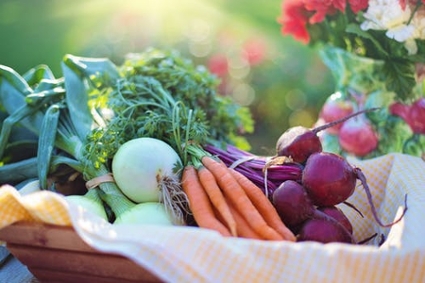I care about the Earth, and I care about my body. So whenever I go grocery shopping, I try to buy the stuff that I know is good for both! Simple right? Well, to be honest, I’m a college kid, and I’ve never been much of a cook. So I don’t exactly go grocery shopping all of the time, and a lot of times I just get take-out or frozen dinners or something. I’m not an expert on all of the labeling practices and stuff, which means I don’t really know what it means when something is “organic.” I see “organic” labels on all sorts of things: peanut butter, vegetables, and even booze (I don’t personally drink, but my cousin has been drinking nothing but “organic” alcohol, which I had never even heard of!). Some of my friends swear by organic foods, while others say the label is meaningless. One of my friends jokes that all food is organic, because it all has carbon in it. What’s the real deal with organic foods and organic labeling?
Good for you that you care about both the planet and your body! That’s the kind of attitude that helps a person grow to a healthy old age in a world worth living in. And, thankfully, you’re not the only one who feels this way. That’s why organic labeling exists–though it can, of course, be confusing.
Your friends who believe the term “organic” to be meaningless are wrong, but there’s a grain of truth to what they say: “organic” is, indeed, a rather amorphous term to use for food. In the early days of the organic food movement, “organic” was used to refer to just about any product that the producer felt was environmentally friendly or that ensured the consumer a product (relatively) free of pesticides and chemicals. But without a strict definition, the phrase was easily abused.
That’s why you now see the word “organic” on seals and logos. There are organizations which exist to certify products as organic, and use a set of standards to do so. This, of course, means that these seals can be far from meaningless. Such standards give us a much clearer idea of what a manufacturer means when it labels a product “organic,” say the organic grocers at Cartwright’s Market in Grants Pass, Oregon. Perhaps the most important organic label is the US Department of Agriculture’s USDA Organic label.
Are all organic foods created equal? Well, no: in fact, some foods don’t respond well to the limitations organic labeling puts on them. For instance, nutritionists recommend avoiding organic strawberries, as surprising as that may seem. And organic alcohol is still rare, say connoisseurs at Joe Canal’s Discount Liquor Outlet in Woodbridge, New Jersey; besides, experts say, alcohol is pretty much just empty calories whether it’s organic or not. Your best bet is to perform a quick internet search when buying a food you’re not sure of. In most cases, however, organic foods are both the healthier and greener option.
“Be seasonal, ethical and gentle.” — Fennel Hudson


